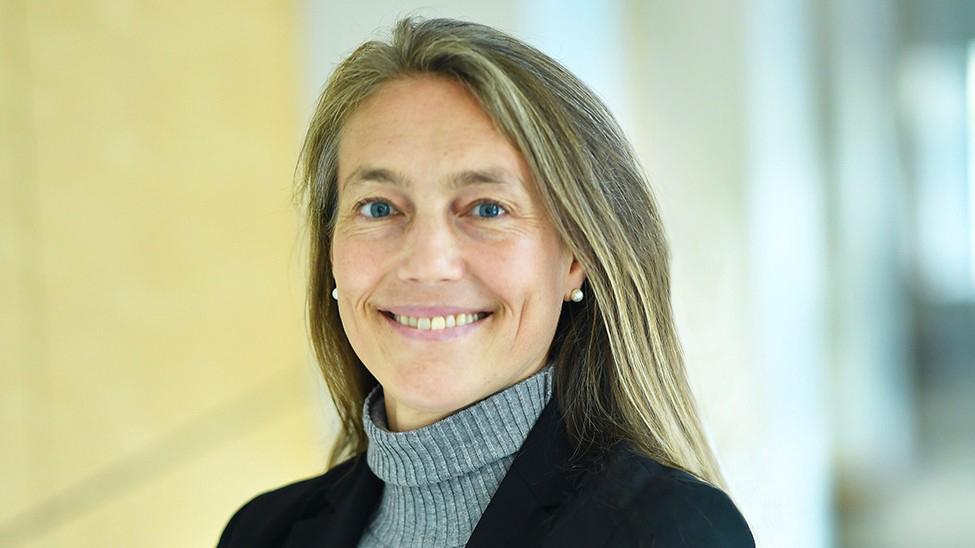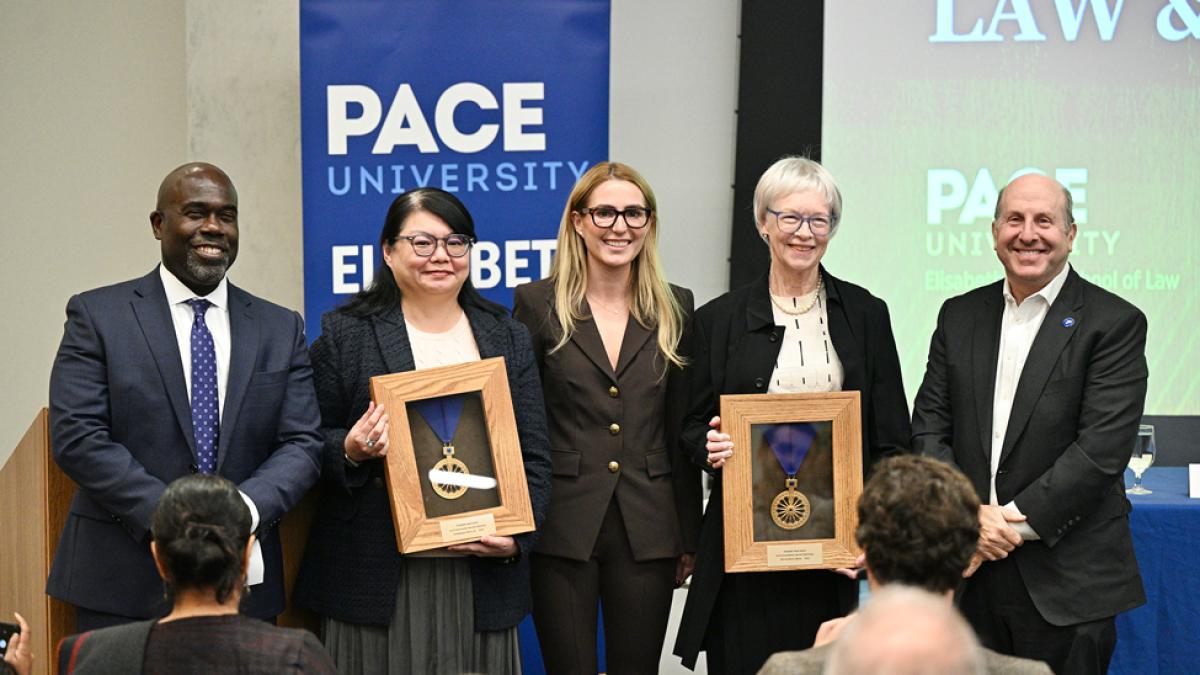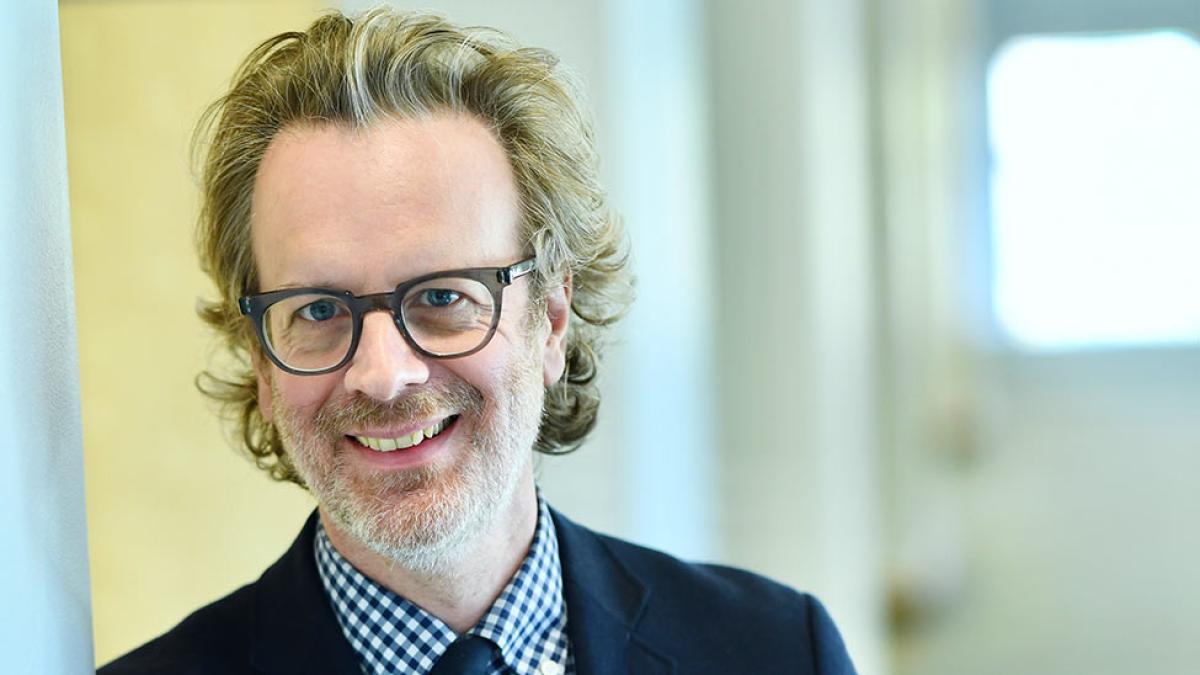
Pace|Haub Environmental Law Professor Katrina Fischer Kuh Co-Edits Book on Law, Justice and Adaptation in a Superheated Climate


The Elisabeth Haub School of Law at Pace University is pleased to announce the release of a timely new book from Pace|Haub Environmental Law Professor Katrina Fischer Kuh, along with co-editor Professor Shannon M. Roesler of the University of Iowa College of Law titled, Adapting to High-Level Warming: Law, Governance, and Equity.
Published by Environmental Law Institute (ELI) Press, the book is the offspring of the Environmental Law Collaborative—a rotating group of law professors who assemble every other year to think, discuss, and write on important challenges in environmental law. Professor Kuh and Professor Roesler co-edited the volume and contributed chapters to the book which also features 17 contributing authors who are global environmental scholars and thought leaders.
Most legal scholarship assumes a 2°C warming as the upper bound of temperature change, but robust science increasingly tells us a different story: warming beyond 2°C is likely and warming as high as 3°–4°C by the end of the 21st century is a real possibility. Warming of this magnitude would have significant impacts on people, places, and our planet. How can governance systems and institutions adapt today to prepare us for these future shocks? And what will be the general and specific challenges to law and policy? These concerns are the subject of Adapting to High-Level Warming.
“Peer reviewed science suggests that we are headed for higher level warming that will have impact beyond those that we have imagined or begun to discuss,” said Professor Kuh, Haub Distinguished Professor of Environmental Law at the Elisabeth Haub School of Law at Pace University. She highlighted the recent, unforeseen impacts of climate change, pointing to the devastation wrought by Hurricane Helene in Asheville and across Western North Carolina. “I hope the book underscores the extent to which we have engaged in mass hubris about our ability to predict what climate change looks like—how it will manifest, for whom, and where,” she added. “It is incredibly important that we erase the blind spot in our adaptation law and planning in the United States and begin to think and talk in a serious way about what preparing for high-level warming would actually look like.”
“It is incredibly important that we erase the blind spot in our adaptation law and planning in the United States and begin to think and talk in a serious way about what preparing for high-level warming would actually look like.”
“Efforts to mitigate the devastating consequences of climate change remain paramount, but new governance structures will also be needed to address a future shaped by high levels of warming, commented Rachel Jean-Baptiste, ELI’s Vice President for Publications. “Because existing law and policy largely ignore this possibility, the Environmental Law Collaborative took it upon themselves to explore what 4°C might mean for a variety of current legal doctrines, planning policies, governance structures, and institutions.”
The fifth in a series by the Environmental Law Collaborative, Adapting to High-Level Warming begins by identifying and offering solutions to address the mismatch between today’s legal and regulatory systems and the conditions and demands of high-level warming. The next set of chapters imagine more broadly the challenges of effective governance— across a range of laws, through democratic processes—under high-level warming. The book’s concluding chapters focus on equity and justice. Many of the ideas proposed in this book may sound wildly ambitious today but will ultimately appear modest when weighed against the tolls of a superheated climate.
Katrina Fischer Kuh is the Haub Distinguished Professor of Environmental Law at the Elisabeth Haub School of Law at Pace University, and Shannon M. Roesler is the Charlotte and Frederick Hubbell Professor of Environmental and Natural Resources Law and the Faculty Director of the Hubbell Environmental Law Initiative at the University of Iowa College of Law. Other contributing authors include:
- Karrigan Börk, Acting Professor of Law at UC Davis
- Karen Bradshaw, Professor of Law at the Sandra Day O’Connor College of Law Arizona State University
- Cinnamon Carlarne, President and Dean at Albany Law School, where she is also a Professor
- Robin Kundis Craig, Robert A. Schroeder Distinguished Professor at the University of Kansas School of Law
- Sarah Fox, Associate Professor at Northern Illinois University College of Law
- Joshua Ulan Galperin, Associate Professor at the Elisabeth Haub School of Law at Pace University
- Michael B. Gerrard, Andrew Sabin Professor of Professional Practice and founder and faculty director of the Sabin Center for Climate Change Law at Columbia Law School
- Keith H. Hirokawa, Distinguished Professor of Law at Albany Law School.
- Shi-Ling Hsu, D’Alemberte Professor at the Florida State University College of Law
- Kevin J. Lynch, Associate Professor at the University of Denver Sturm College of Law
- Michele Okoh, Assistant Professor at Lewis & Clark Law School.
- Jessica Owley, Professor of Law and Director of the Environmental Law Program at the University of Miami
- Melissa Powers, Jeffrey Bain Faculty Scholar and Professor of Law at Lewis & Clark Law School
- J.B. Ruhl, David Daniels Allen Distinguished Chair of Law at Vanderbilt University Law School
- Jim Salzman, Donald Bren Distinguished Professor of Environmental Law with joint appointments at the Bren School of Environment and UCLA Law School
- David Takacs, Professor of Law at UC Law San Francisco
- Clifford J. Villa, Deputy Assistant Administrator for the U.S. Environmental Protection Agency, Office of Land and Emergency Management, on leave from the University of New Mexico School of Law
Learn more about Adapting to High-Level Warming: Law, Governance, and Equity.
More from Pace
The Elisabeth Haub School of Law at Pace University proudly awarded the prestigious 2024 Elisabeth Haub Award for Environmental Law and Diplomacy to Singapore’s Ambassador for International Law, Rena Lee, and Kristina Maria Gjerde, Senior High Seas Advisor to the International Union for Conservation of Nature (IUCN).
The Elisabeth Haub School of Law at Pace University is pleased to announce that three new members have joined its Board of Visitors. All three members, Basil Seggos ’01, Jacqueline Hattar ’91, and Jud Siebert ’85, are distinguished Haub Law alumni.
The Elisabeth Haub School of Law at Pace University is proud to announce that Professor Alexander K.A. Greenawalt was awarded the 2024 Goettel Prize for Faculty Scholarship for his article, “With Intent to Destroy in Whole or in Part: Genocide, Ethnic Cleansing, and a Lost History,” which was published by Wisconsin Law Review earlier this year (2024 Wis. L. Rev. 933 (2024)).


